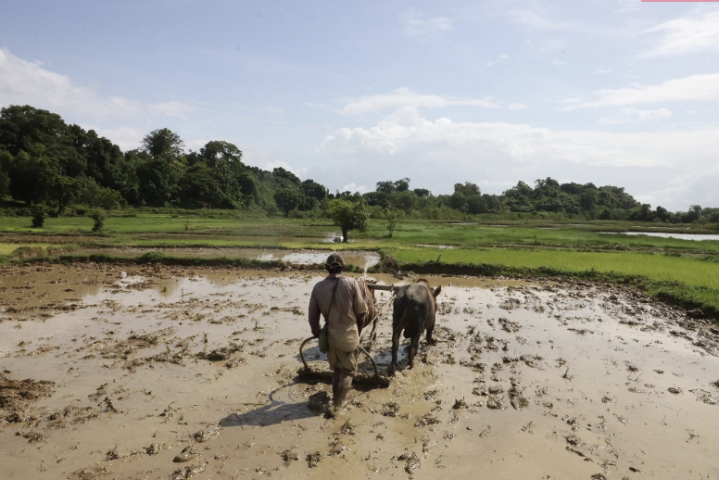According to farmers, most of the farmlands in Maungdaw, Thandwe, Ann, Taungup and Kyaukphyu Townships in Arakan State, where fighting between the military junta and Arakan Army (AA) troops is ongoing, cannot yet be cultivated for monsoon paddy.
Due to the conflict and the threat of artillery, air strikes and landmines, only around 30 percent of the farmland in these areas can be cultivated, according to the farmers.
“Everyone has fled, so there is no one left to farm. Villages near towns and close to strategically important hilltop camps and other military positions can’t be farmed either,” said a farmer from Shwe Yin Aye village in Maungdaw Township.
Locals report that 80 percent of cultivable land in villages such as Nyaung Chaung, Shwe Yin Aye, Pan Taw Pyin, Thit Taw, Hla Baw Zar and Inn Din in Maungdaw Township cannot yet be used to grow monsoon paddy.
In Thandwe Township, where there is fierce fighting, the residents of over 20 villages have been displaced by the conflict. Farmers from other villages are struggling to grow paddy due to the high cost of inputs.
A farmer from Thandwe Township said: “The cattle have been killed by artillery shelling. We can’t grow anything now as we flee during the planting season. We don’t even know how we’ll make a living next year.”
In addition, farmers from over 20 villages in Kyaukphyu Township, including Saing Chon, Sit Taw, Si Maw, Shauk Chaung, Thet Poke Taung, Gone Chaing and Ohn Taw, are unable to farm due to the threat of landmines.
Locals report that military junta troops have set up makeshift camps near these villages and laid landmines in fields, mountain paths and near hills.
“There are frequent landmine explosions in the fields, on the forest edges and on the hills near the fields. That is why some farmers in our village can’t work in their fields even though it’s rice planting season,” said a farmer from Ku Lar Bar village.
In AA-controlled townships such as Kyauktaw, Mrauk-U, Minbya, Pauktaw, Ponnagyun, Buthidaung, Rathedaung, Ramree and Myebon, farmers are facing challenges due to fertilizer shortages, high fuel prices and increased input costs.
Farmers are also concerned about the risk of landmines and unexploded ordnance as clashes have occurred near agricultural areas.
“Due to high fuel prices, we can’t use machinery. We are plowing with the oxen we have. We don’t also have enough stock of seeds. We also can’t get fertilizer. All farmers feel heavy-hearted about farming this year,” said a farmer from Ah Pauk Wa village in Kyauktaw Township.
The Arakan Army has stated that it will provide the necessary support for agricultural work to help farmers in Arakan State to cultivate their farmland in time this year.
Currently, farmers in some Arakan townships are plowing with tractors. At the same time, surveys are being conducted to distribute seeds, inputs and farming equipment, according to local farmers.
There are over 1.25 million acres of farmland in Arakan State. Last year, only over 900,000 acres could be cultivated due to Cyclone Mocha. This year, farmers are facing numerous challenges and the area under cultivation is likely to decrease.
“Even under normal circumstances, there isn’t enough rice for domestic consumption. If cultivation declines in times like these, food security could face major challenges next year. The AA is also responsible for reviving the agriculture sector in Arakan,” said a businessman from the state.
About 70 percent of the Arakan’s rural population depend mainly on agriculture for their livelihood. This sector is also the main economic backbone of the state.
Sent by Aung Htein (DMG).

